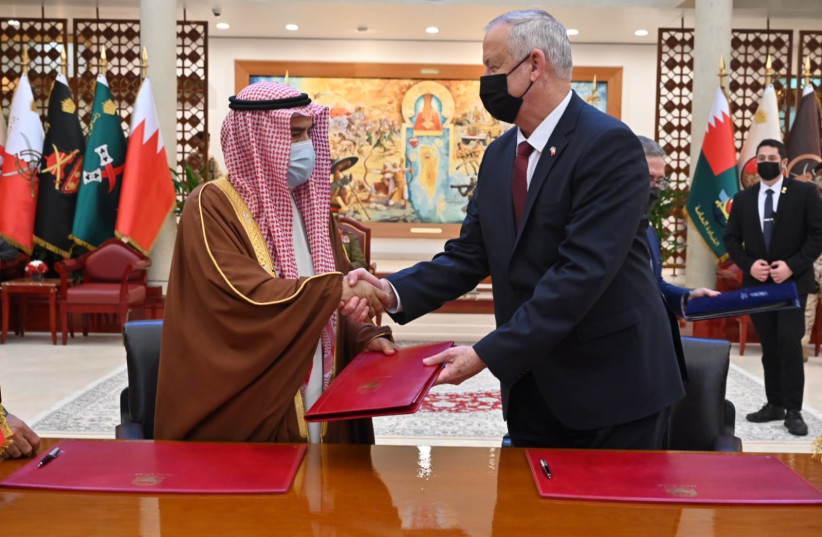Once upon a time, say two years ago, the flight of an Israeli defense minister in an Israeli Air Force plane over Saudi Arabian airspace to sign a defense Memorandum of Understanding with a Gulf country would have been major, breathtaking news.
No longer.
On Wednesday, Defense Minister Benny Gantz flew to Bahrain on the same plane that Egyptian president Anwar Sadat used to fly to Israel for the first time 45 years ago. The story was found on page 18 in Yediot Aharonot.
Why?
Not because the public is not thrilled by the peace agreements with Bahrain, the United Arab Emirates and Morocco, but because these types of visits have become routine, even ho-hum.

On Sunday, President Isaac Herzog made the first-ever presidential visit to the United Arab Emirates. On Wednesday, Gantz was the first Israeli defense minister to formally visit one of the Gulf states.
There are only so many “firsts” that can still foment interest, so off goes Gantz, to page 18.
But even though these trips may swiftly be losing their capacity to excite the public – Gantz traveled to Morocco in November to sign a defense Memorandum of Understanding there as well – they should definitely not be taken for granted.
It is by no means a given that in an age when the Palestinian Authority is pursuing cases against the IDF at the International Criminal Court, when Amnesty International just called on the countries of the world to end arms trade with Israel, and when there are legions in the Arab and Muslim world who view Israel as their mortal enemy, that an Arab country will host – open and with fanfare – the head of the pyramid of Israel’s defense establishment.
What is remarkable in Gantz’s Bahrain visit is the degree that these visits have so quickly become unremarkable.
What is also remarkable is that despite a peace treaty of 44 years with Egypt, and 28 years with Jordan, this type of visit by the defense minister – in broad daylight, with pomp and circumstance and publicly signed bilateral agreements – would never happen there.
And that attests to the very different nature of peace emerging between Israel and Abraham Accord countries – the United Arab Emirates, Bahrain, and Morocco – and the peace treaties with Egypt and Jordan. The latter is a cold peace that the governments do their best to keep in the closet; the former is a warm peace that the governments have no qualms about broadcasting loudly.
There are many different reasons for the different natures of the peace, one warm and the other cold: Egypt and Jordan fought bloody wars with Israel and carry that memory, Jordan has a majority Palestinian population, and both countries share a border with Israel. But the governments in the UAE, Bahrain and Morocco are doing what they can to ensure that the peace does not remain in the rarefied air of the leaders and security heads, but filters down to the people. The same has never been true in Jordan and Egypt.
For Jordan and Egypt, the security component of the relationship is what concerns them the most. The rest is far less important.
The security aspects of the relationship are also key in Israel’s relationship with the UAE and Bahrain – it was security concerns, the shared fear of Iran, that brought the countries together.
Israel’s peace treaties with Egypt and Jordan marked a farewell to the use of arms between those states. Ironically, the peace treaties with the UAE and Bahrain, by contrast, were paved by arms sales – the UAE signed on to the deal after receiving assurances that they would be able to buy F-35 stealth jets from the US. And Gantz’s visit to Bahrain and the understandings signed there indicate that relations with the Gulf countries are being further cemented through the defense and security agreements and cooperation.
That, however, is not all that there is. That the Bahrainis are unafraid to host Gantz out in the open sends an unmistakable message internally: cooperation with Israel, even on defense matters, is not only acceptable, but it is also even desirable. This makes such cooperation normal and habituates the public to that idea – something not yet seen in Egypt or Jordan, despite decades-old peace treaties.
